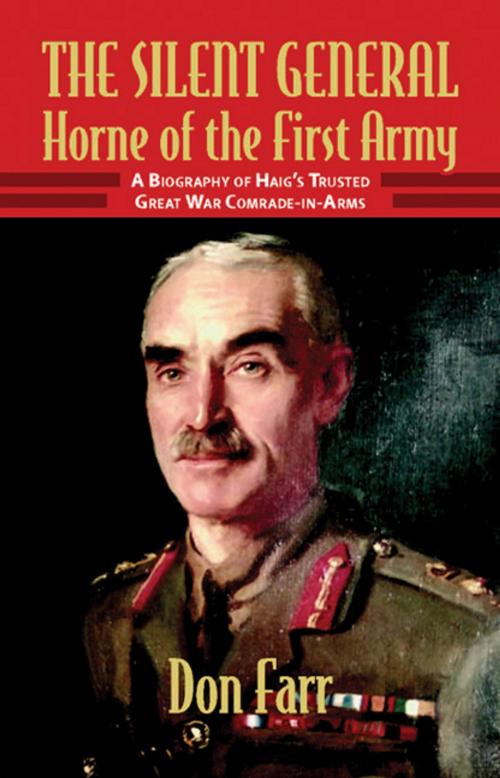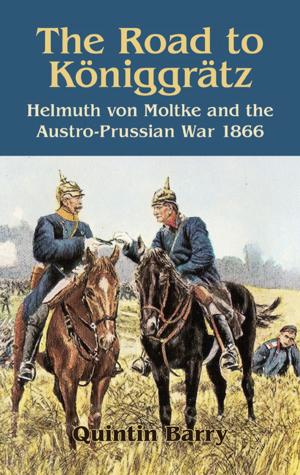The Silent General: Horne of the First Army
A Biography of Haig's Trusted Great War Comrade-in-Arms
Nonfiction, History, Military, World War I| Author: | Don Farr | ISBN: | 9781907677984 |
| Publisher: | Helion and Company | Publication: | June 8, 2007 |
| Imprint: | Helion and Company | Language: | English |
| Author: | Don Farr |
| ISBN: | 9781907677984 |
| Publisher: | Helion and Company |
| Publication: | June 8, 2007 |
| Imprint: | Helion and Company |
| Language: | English |
Whether or not Henry Sinclair Horne was the ‘silent’ General he might certainly, if he were still alive, lay claim to being the ‘forgotten’ General of the Western Front. His self-effacement in a profession not renowned for shrinking violets undoubtedly made its contribution to his relative anonymity - he wrote no memoirs nor kept anything more than sketchy diaries - but it is still surprising that such an important contributor to the defeat of the German army in the Great War has not until now received the attentions of a biographer. After a customary slow start in the late Victorian army, Henry Horne first made an impact during the Boer War, fortuitously as it was to turn out, under the eyes of a Colonel Douglas Haig.
By the outbreak of the Great War, Henry Horne was a Brigadier General. Two years later he was a full General in command of the BEF’s First Army. His was one of the most rapid elevations to top rank recorded in the war. In the two years he spent as an army commander he commanded the brilliant capture of Vimy Ridge, the desperate defensive Battle of the Lys, the successful assault on the Drocourt-Quéant Switch, the outstanding crossing of the Canal du Nord and the liberation of Douai, Cambrai, Lens, Valenciennes and Mons. Napoleon always sought to ensure that his generals were lucky. In that respect Henry Horne would have suited him. He was lucky in having a long-standing close professional relationship with the Commander-in-Chief, FM Haig; in having under his command at First Army the elite Canadian Corps and some distinguished British divisions; and in having as his Chief of Staff one of the outstanding staff officers of the war.
But there was more to Henry Horne than just luck. This belated biography assesses Henry Horne’s relationship with Haig and the Canadian Corps. It also evaluates his contribution to the technical advances of the artillery during the war and describes the battles which he conducted. It attempts to accord to Henry Horne the recognition and credit that he deserves but which has for so long been withheld.
Whether or not Henry Sinclair Horne was the ‘silent’ General he might certainly, if he were still alive, lay claim to being the ‘forgotten’ General of the Western Front. His self-effacement in a profession not renowned for shrinking violets undoubtedly made its contribution to his relative anonymity - he wrote no memoirs nor kept anything more than sketchy diaries - but it is still surprising that such an important contributor to the defeat of the German army in the Great War has not until now received the attentions of a biographer. After a customary slow start in the late Victorian army, Henry Horne first made an impact during the Boer War, fortuitously as it was to turn out, under the eyes of a Colonel Douglas Haig.
By the outbreak of the Great War, Henry Horne was a Brigadier General. Two years later he was a full General in command of the BEF’s First Army. His was one of the most rapid elevations to top rank recorded in the war. In the two years he spent as an army commander he commanded the brilliant capture of Vimy Ridge, the desperate defensive Battle of the Lys, the successful assault on the Drocourt-Quéant Switch, the outstanding crossing of the Canal du Nord and the liberation of Douai, Cambrai, Lens, Valenciennes and Mons. Napoleon always sought to ensure that his generals were lucky. In that respect Henry Horne would have suited him. He was lucky in having a long-standing close professional relationship with the Commander-in-Chief, FM Haig; in having under his command at First Army the elite Canadian Corps and some distinguished British divisions; and in having as his Chief of Staff one of the outstanding staff officers of the war.
But there was more to Henry Horne than just luck. This belated biography assesses Henry Horne’s relationship with Haig and the Canadian Corps. It also evaluates his contribution to the technical advances of the artillery during the war and describes the battles which he conducted. It attempts to accord to Henry Horne the recognition and credit that he deserves but which has for so long been withheld.















